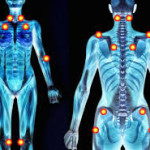 People who suffer from fibromyalgia will find specific factors that will make their pain worse. These things include anxiety, stress, depression, hormonal fluctuations, infections, physical exhaustion, changes in the weather and lack of sleep.
People who suffer from fibromyalgia will find specific factors that will make their pain worse. These things include anxiety, stress, depression, hormonal fluctuations, infections, physical exhaustion, changes in the weather and lack of sleep.
There is no conclusive test which identifies an individual who has fibromyalgia because, at this time, physicians are unaware of what actually causes the condition. They believe that it is most likely a variety of factors working together that can include genetics, infections and physical or emotional trauma. Repeated stimulation may cause the brains of individuals who suffer with fibromyalgia to change. The change likely involves an increase in the level of certain neurotransmitters that signal pain in the body.
 Individuals who are at higher risk of developing this condition have factors that include gender, age, chronic disturbed sleep pattern, family history and rheumatic disease. Women are more likely than men to develop fibromyalgia and the condition often develops during early and middle adulthood. People who have sleep disorders, such as restless leg syndrome or sleep apnea, will also be at higher risk to develop fibromyalgia. Any type of rheumatic disease, such as rheumatoid arthritis or lupus will also place an individual at higher risk for developing fibromyalgia.
Individuals who are at higher risk of developing this condition have factors that include gender, age, chronic disturbed sleep pattern, family history and rheumatic disease. Women are more likely than men to develop fibromyalgia and the condition often develops during early and middle adulthood. People who have sleep disorders, such as restless leg syndrome or sleep apnea, will also be at higher risk to develop fibromyalgia. Any type of rheumatic disease, such as rheumatoid arthritis or lupus will also place an individual at higher risk for developing fibromyalgia.
Treatment recommendations will also include reducing stress, getting enough sleep, exercising regularly, pacing yourself and maintaining a healthy lifestyle. Individuals who experienced fibromyalgia should limit their caffeine intake, eat healthy foods and find something that is enjoyable and fulfilling in every single day.
Some also find relief using acupuncture, physical therapy, chiropractic care, massage therapy and will do best when they receive support from their family, friends and the community of individuals who also suffer from fibromyalgia. Organizations such as the Arthritis Foundation and the American Chronic Pain Association provide classes and access to support groups where individuals find the level of help and advice they would not find anywhere else.
References:
(1) Fibromyalgia Network: Diagnosis
http://www.fmnetnews.com/fibro-basics/diagnosis
(2) American College of Rheumatology: The American College of Rheumatology Preliminary Diagnostic Criteria for Fibromyalgia and Measurement of Symptom Severity
(3) MayoClinic: Fibromyalgia
http://www.mayoclinic.com/health/fibromyalgia/ds00079/dsection=symptoms
(4) American Family Physician: Treating Fibromyalgia
http://www.aafp.org/afp/2000/1001/p1575.html
| Advertisement | |
 |
|



Leave a Reply